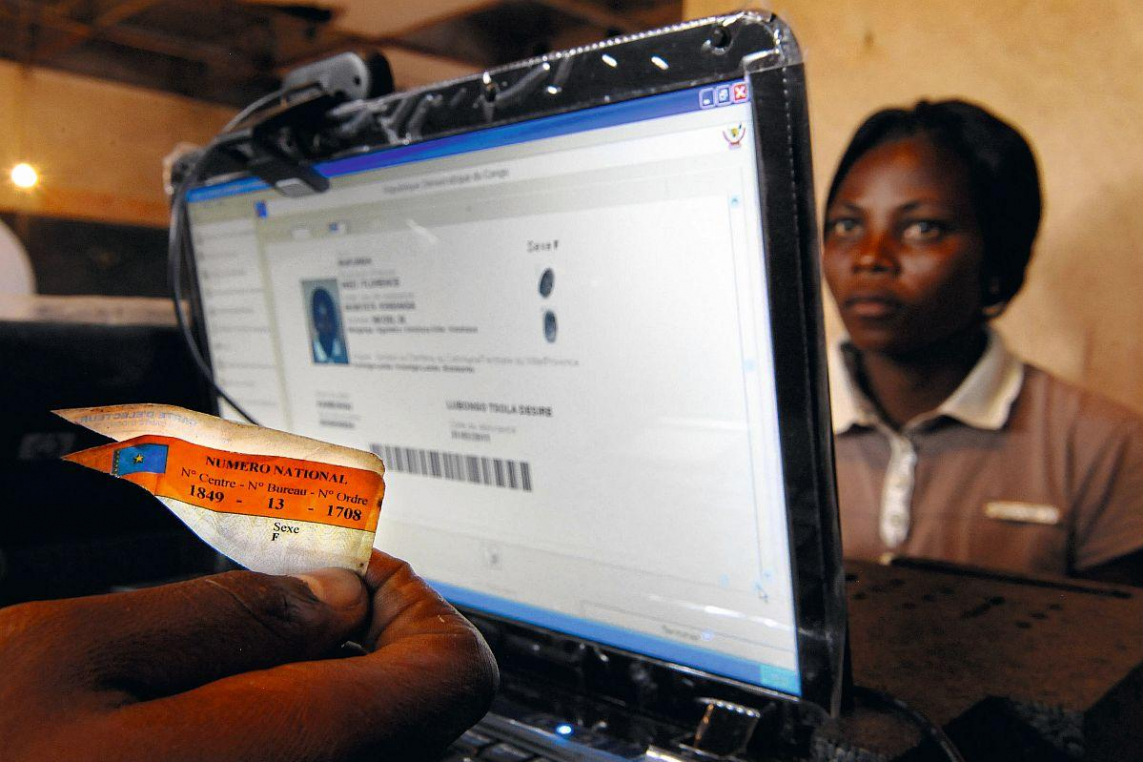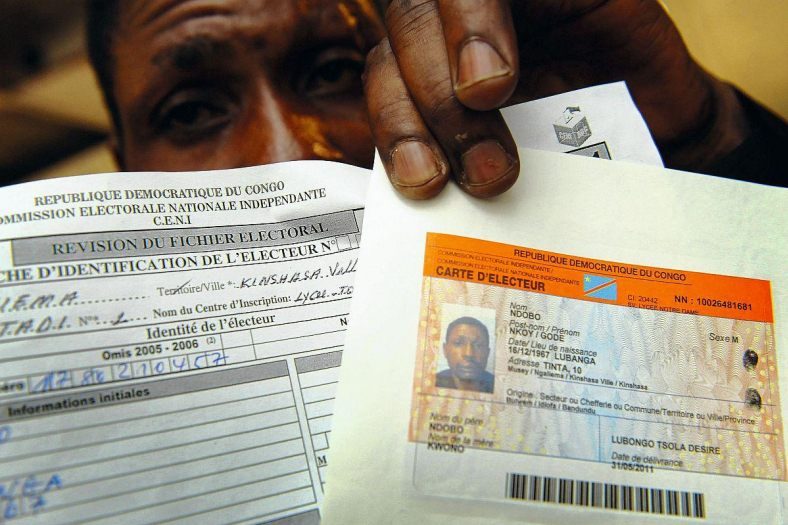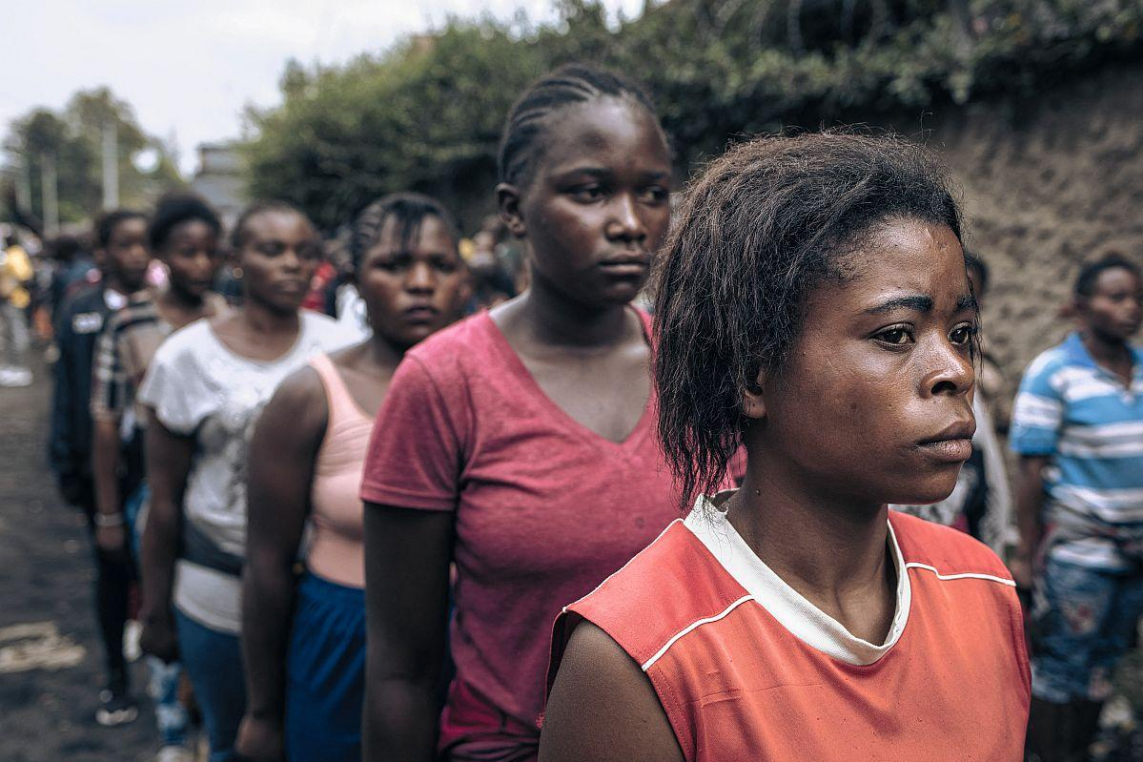Kris Berwouts (°1963-2023) studeerde Afrikaanse taalkunde en geschiedenis in Gent.
‘If I want to, I can change my identity tomorrow’

Without a central database and organization, applying for identity papers in Congo often remains a question of putting money on the table.
© Belgaimage / Benoît Doppagne
The Congolese public administration must deliver official documents faster and more correctly, President Félix Tshisekedi believes. But there is still a long way to go, as the experiences of ordinary Congolese prove time and again. Without a central database and organisation, applying for identity papers often remains a matter of putting money on the table.
This article was translated by Kompreno, with support from DeepL. Original source.
A dynamic public administration, Congolese President Félix Tshisekedi told the Council of Ministers on 7 October 2022, is necessary for a stronger state authority and for the country’s development. And, he continued, the quality of such a public administration must also be reflected in the fact that official documents are delivered correctly and promptly.
But this is not the case in the Democratic Republic of Congo. Passports, school certificates, driving licenses, property deeds and other documents are often issued only after months or even years. Identity cards have not existed since the fall of the Mobutu regime a quarter of a century ago. Tshisekedi ordered his government to put clear options on the table before New Year to solve that problem.
‘I remember the identity cards from Mobutu’s time very well,’ Pascal Rukengwa, professor of political science in Kinshasa, who grew up during that time, tells me.
‘Carte d’identité pour citoyen (citizen identity card, ed.) was the official name. The card was of questionable quality. You could easily forge them by replacing the name or address. They were manufactured locally, without the slightest central supervision.’
‘After that, we had nothing for a long time,’ continues Rukengwa, ‘until the elections. Then we got the cartes électorales (electoral cards, ed.), which became a kind of replacement for identity cards. Soon there were places where they became compulsory. But other documents were also sometimes used as ‘identity cards,’ a driving license for instance.’
For many years, Rukengwa was one of the national figureheads of civil society. He represented the latter in the National Electoral Commission between 2003 and 2010. He was also politically active for a long time, including in former President Kabila’s cabinet during the last years of his rule (2001-2019).
If I want, I can change my identity tomorrow. All I have to do is apply for a passport in the name I want to use.
Pascal Rukengwa, professor of political science in Kinshasa
In those days, for instance, you had to present the electoral card as proof of identity during police checks. All kinds of institutions asked that you hand it in at the receptions before being allowed inside. It soon became the general rule, including in foreign embassies. But that was not the purpose of such a voter card at all.
Human rights pioneer Floribert Chebeya, for instance, who was assassinated in 2010, had no electoral card at all. He thought the elections were a mockery of democracy and wanted nothing to do with the whole masquerade. So he did not register. As a result, he no longer got into embassies.
‘By now we are used to living without papers,’ says Rukengwa, ‘Even our international passports are not obtained in the traditional way. There is nobody who can check whether you are indeed the person you claim to be. If I want, I can change my identity tomorrow. All I have to do is apply for a passport in the name I want to use. By the way, whoever wants, can apply for several passports, each under a different name.’

A registration card from the 2011 elections. ‘The ‘cartes électorales’ we received have become a kind of replacement for identity cards.’
© Belgaimage / Benoît Doppagne
A card for those who pay
I myself experienced several times at close quarters how such a voter card can be used improperly. In the run-up to the 2011 elections, I spoke to Furaha, a 15-year-old girl from Bunyakiri. She had registered as a voter, even though you had to be 18 to vote. Her mother aspired to a seat in parliament, and every vote counted. It worked out. On election day, Furaha queued up at the polling station. Noone prevented her from voting. When she got out, she joined the queue at another polling station and voted again.
A voter card often turns out to be easily obtained by improper means, even outside election times. In 2013, I had a lot of contact with Flora, a collaborator of Rwandan opponent Victoire Ingabire. As a student leader in Rwanda, she had helped to organise an action against the cancellation of a number of student scholarships, was persecuted and threatened in Rwanda, managed to escape, and then hid for a short time in Bukavu, eastern Congo.
But even there she was particularly vulnerable, as a Rwandan refugee in a region where Rwandan security forces had a free hand. Human rights activist friends had a solution: for $20, Flora could get a Congolese carte électorale. We were at least three years away from elections, but they could still get an electoral card made quickly and cheaply.
Getting the right papers to get married as a Congolese in Belgium? ‘At each step you have to slip bribes, or the process drags on for months.’
In Flora’s case, it was a piece of cake. She could keep her real name and date of birth. Only the card did not mention the place in Rwanda where she was really born, near the border with Congo, but a fake birthplace a kilometre and a half away, on the Congolese side of that border. So she got across Lake Kivu smoothly, to Goma.
Flora wanted to seek asylum in Uganda. So the next stages on her escape route were Virunga National Park and the eastern Congolese town of Butembo, and then across the border. An acquaintance from Goma brought solace: he knew an institution where Congolese students could buy a laissez-passer, valid throughout the East African Community, for a mere $50. Thus Flora became a young Kinyarwanda-speaking Congolese who was to study in Uganda’s capital Kampala.
A few days later, she arrived there and assumed her real identity again. The fake Congolese papers and regional student card allowed her to escape persecution in Rwanda. She did not have to present any personal documents; paying money was enough.
The problem for Congo is that very many people from neighbouring countries have acquired a Congolese identity in this way over the past two decades.
Accused of fraud
Getting hold of the correct documents in time is also a feat for Congolese living in Belgium. So too for Justin K., a Congolese artist living in Tienen today. Love brought him to Belgium. He has been living with Margot for years, their son is now five. Justin and Margot got married last month. The preparation of the marriage was very stressful.
Justin had to present three documents: his birth certificate, proof of his nationality and proof of his unmarried status. ‘That doesn’t seem excessive, but it’s grueling,’ he says. ‘Once you have them in your hands, those documents have to be validated at the Congolese ministries of justice and foreign affairs, and eventually by the Belgian embassy. But at each step you have to slip bribes, or the process drags on for months, whereas the documents are only valid for six months.’
‘What does that mean, “a falsification”, in the virtual reality of Congo’s official documents?’
Justin K., artist
Justin managed to get everything done in one month. It cost him 1,800 euros to get the administrative mill running smoothly, on top of the regular cost of the documents and sworn translations of 60 euros per page.
His Congolese documents did cause Justin more headaches in Belgium. For instance, he was accused of forgery when he wanted to exchange his Congolese driving license for a Belgian one in Tienen. Years ago, he attended a one-week driving school in hometown Kisangani and successfully passed his driving test there.
The driving license he subsequently received looked good. ‘Cleanly done, nicely printed. I drove around Kisangani with it unimpeded.’ Justin presented his Congolese driving license at the Tienen municipality and paid for the Belgian copy. But a few days later, he received a letter from the police: ‘I was accused of fraud. They had come to the conclusion that the Congolese driving license was a falsification.’
But what does that mean, a falsification, in the virtual reality of Congo’s official documents? Justin had taken driving lessons, passed an exam and received a document. ‘The cops were thankfully friendly, they believed I acted in good faith. I had also never used the Congolese driving license in Belgium. The complaint was withdrawn, but I could not simply exchange my Congolese document for a Belgian one. I had to take a driving test again.’

In eastern Congo (photo: Goma), where violence is raging and the Rwandan security services had free reign, false papers come in handy to stay under the radar.
© Belgaimage / Alexis Huhuet
Studying in a non-existent country
It gets even more unregulated when you not only have to deal with the virtual reality of Congolese official documents, but also need them to travel to a state that is not recognised. Divine Fazila lives in Nicosia, capital of northern Cyprus. The northern part of Cyprus declared independence in 1983, but no country except Turkey recognises that independence.
Northern Cyprus is trying to put itself on the international map by having an ever-growing community of African students pursue higher education there. Divine was due to study medicine in Nicosia. To do so, she had to present proof that she had been vaccinated against yellow fever.
‘The problem is that there is no central database anywhere.’
Divine Fazila, medical student
She had to ride the bumpy road to official documents as well: ‘I went to the Congolese Ministry of Health to get my vaccination card. I could get a shot on the spot and leave with the vaccination card. Or I could collect, for the same price, a card without vaccination but with the official stamps.’ A forged medical document was not what the future medical student wanted.
The way she obtained the other documents also sounds familiar by now. ‘I was thoroughly interrogated to get my birth certificate. Who I was, where I came from, details about my parents and even grandparents. But that is all a smokescreen. My interrogators were only concerned about money.’ The only document she had to produce was the electoral card. And to obtain it, she had never had to show any other document.
‘The problem is that there is no central database anywhere. All kinds of documents are issued, either correctly or underhandedly, but there is no place where all these data come together.’ Divine’s arrival in Nicosia was also without much protocol. Northern Cyprus has no embassies, so she travelled with her university’s acceptance letter. ‘Upon arrival, I was given a provisional visa, which was then extended later,’ she says.
To be accepted at the university, she did have to present a document showing that her parents could finance their part of the studies. ‘And of course my diplomas as well. That too is regularly defrauded in Congo. But if you get caught doing that in Nicosia, they put you on a plane home.’
Existential uncertainty
The twilight zone is not only about identity documents in Congo, but also about every other kind of document. Including property deeds, and this ambiguity naturally creates a lot of conflict. The vast majority of cases in court are about ownership disputes. Who owns which land or company is not recorded crystal clear. It contributes to instability and livelihood insecurity, and to a context where rumours and conspiracy theories are rampant.
‘Documents that exist administratively but not in in the real world contribute to insecurity and lawlessness,’ argues Gisèle Faida, who works as a consultant with various civil society bodies. ’ We urgently need a mechanism, an instrument to check the authenticity of documents. And for that, state authority must be restored over the entire Congolese territory. We are far from there.’
About this article
Journalist Kris Berwouts: ‘I sometimes catch myself finding them amusing — the anecdotes from Absurdistan — where people make confetti out of the paper tiger. Where, if you need a document, you throw some confetti in the air that coalesces on the ground into what you need. Maybe the world is more beautiful without all those papers. Is the fact that we would need them an imported Western concept?
In any case: the paper tiger does exist, and it swallows money. Too much money for the vast majority of the Congolese population. I initially hesitated to write this article because it does not deal with blatant human rights violations. But this problem does represent a cornerstone of a state in a state of decay. The administration’s failure to function only widens the gap between the haves and the havenots. It is a fundamental injustice.’
Maak MO* mee mogelijk.
Word proMO* net als 2798 andere lezers en maak MO* mee mogelijk. Zo blijven al onze verhalen gratis online beschikbaar voor iédereen.
Meer verhalen
-
Report
-
Report
-
Report
-
Interview
-
Analysis
-
Report










 Oxfam België
Oxfam België Handicap International
Handicap International